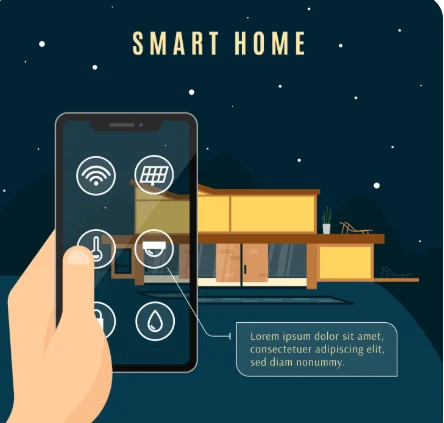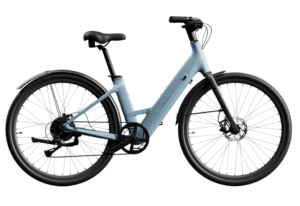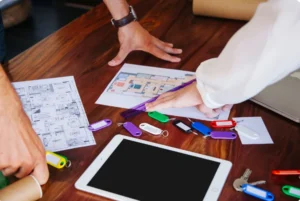Do you ever get the feeling you need another remote for your remote?
You’ve got an app for heating, an app for lighting, and another app for the doorbell. Kind of a mess, isn’t it? But the good news is that the smart home app landscape in the UK is changing. And changing quickly.
No more being just a flashy product. But actually, engineering adds value to your life, helping to save us money and adding security to our homes. We have finally graduated from the novelty of it to real practical usage.
What’s driving this?
Well, a few things are unique to us here in the UK. We’ve got our own style of homes, we’ve got a sharp eye on those climbing energy bills, and we expect our tech to just… work. The standard for a good app is incredibly high. It needs to be as smooth and bug-free as something from a top mobile game development company, but with the reliability of a utility.
So let’s dive into the biggest trends shaping the future of smart homes right here in the UK. To get this right, you really need a top mobile app development company in UK, businesses rely on.
Trend 1: The ‘One App to Rule Them All’
The single biggest complaint from smart home owners has always been “too many apps”. You have your Hive or Nest for heating, maybe Philips Hue for lights, a Ring doorbell for security, and a bunch of smart plugs from five different brands. It’s cluttered. It’s annoying.
The biggest trend right now is integration. We are seeing a huge push towards a single “super app” or dashboard.
This is where new standards like ‘Matter’ are becoming a big deal. Matter is basically a universal language that lets all your different smart devices talk to each other, regardless of who made them. This means a **mobile app development company UK** team can build a beautiful, simple app that can control your whole home.
Imagine opening one app and seeing your heating, your lights, your security cameras, and even your smart kettle all on one screen. You could create “scenes” like “Movie Night” that dims the lights, turns up the heating, and locks the front door with a single tap.
This isn’t a futuristic dream. It’s happening right now. People are fed up with juggling apps. They want simplicity. The companies that deliver this unified experience are the ones who are going to win the smart home race. It’s about creating a seamless user experience that just works without you having to think about it.
Trend 2: The Energy Saving Obsession
Let’s be honest. For most of us in the UK, the number one reason to get a smart home app isn’t to look cool. It’s to save money. With energy prices being such a massive talking point, smart home apps are becoming powerful financial tools.
This trend goes way beyond just a smart thermostat.
We’re talking about apps that connect directly to your smart meter. They show you in real time exactly how much that long shower or running the tumble dryer is costing you. It’s powerful stuff.
The best apps are now using AI to get even smarter. They learn your family’s routine. They know when the last person leaves the house and automatically turn the heating down. They can even check the weather forecast and pre-heat the house more efficiently before a cold snap hits.
We’re also seeing a rise in smart plug apps that identify “vampire devices”. These are the electronics that suck up power on standby. The app can automatically cut power to them when they aren’t in use.
Some apps are even making it fun. They use points badges and leaderboards to challenge you to use less energy. It’s like a mobile game development company was hired to make saving money feel like a win. When you see you’ve saved £30 that month just from smarter heating, it’s a pretty great feeling. This focus on real pound-and-pence savings is perhaps the most significant trend. To make informed decisions and save even more, homeowners can compare gas company prices alongside their smart home data for a complete picture of their energy costs.
Trend 3: AI That Actually Helps
For a long time, “AI” was just a marketing buzzword. It usually just meant a basic “if this then that” schedule. That’s all changing. The new trend is proactive AI. This is where your home app stops waiting for your commands and starts making helpful suggestions.
This is the kind of advanced work that a truly skilled mobile app development company UK team loves to build.
Here’s an example. Your app’s geofencing (which just means it knows where your phone is) sees, you’ve left the office and are on your way home. It also knows it’s raining and cold. It could send you a push notification, saying “You’re 20 minutes away and it’s cold. Shall I turn the heating on for you?”.
Or maybe your security app notices you haven’t locked the front door by 11 PM, which is unusual for you. It will send you an alert or even lock it for you automatically.
This is all about “ambient computing”. The tech fades into the background. It learns your patterns, your preferences, and your habits. It looks for ways to make your life smoother without you even having to ask. It’s like having a helpful personal assistant who just manages your home for you. This move from reactive commands to proactive assistance is a huge leap forward.
Trend 4: Security That’s Smart, Not Just Loud
Smart security has been popular for a while. We all know about video doorbells. But the new trend is about creating a complete security “bubble” around your home.
It’s about integrating everything. Your video doorbell, your smart locks, your window and door sensors, and your indoor cameras all work together in one app.
But here’s the clever part. The apps are getting smarter about what they tell you. Instead of getting a notification every time a cat walks across your lawn, the app can tell the difference between a person, a pet, and a package.
We’re also seeing apps that use advanced tech to visualize your home. Imagine an app that shows a 3D map of your house with all the sensors. This is the kind of complex visual interface that you’d expect from a mobile game development company, but it’s being used to give you total peace of mind.
Another growing UK trend is the “digital neighborhood watch”. Some apps are creating opt-in local networks. If your camera spots something suspicious, you can share the alert (anonymously) with your registered neighbors. It’s using technology to bring back that community spirit and keep the whole street safer.
Choosing the right developer for this is key. You’re not just building an app, you’re building a security system. You need a trusted mobile app development company in the UK partner who understands data privacy and encryption inside and out.
This is a very different skill set from what a mobile game development company does. For a game, fun is the goal. For a security app, rock-solid reliability and privacy are everything.
So What Does This All Mean For You?
These trends show us that the smart home is finally growing up. It’s not a gimmick anymore. It’s becoming an essential part of our homes. It’s helping us save real money, manage our busy lives, and keep our families safe.
The future is integrated, it’s intelligent, and it’s incredibly practical.
As this tech gets more complex, the company you choose to build your app matters more than ever. You need a partner who gets the UK market. They need to understand the obsession with energy prices, the need for simple design, and the absolute demand for privacy and security.
Whether you’re a property developer looking to build smart flats or a startup with a brand new hardware idea, finding the right mobile app development company in the UK team is the first step. This isn’t the same as hiring a mobile game development company to make something fun. This is about building the reliable and smart core of someone’s home. And that’s a big responsibility.







